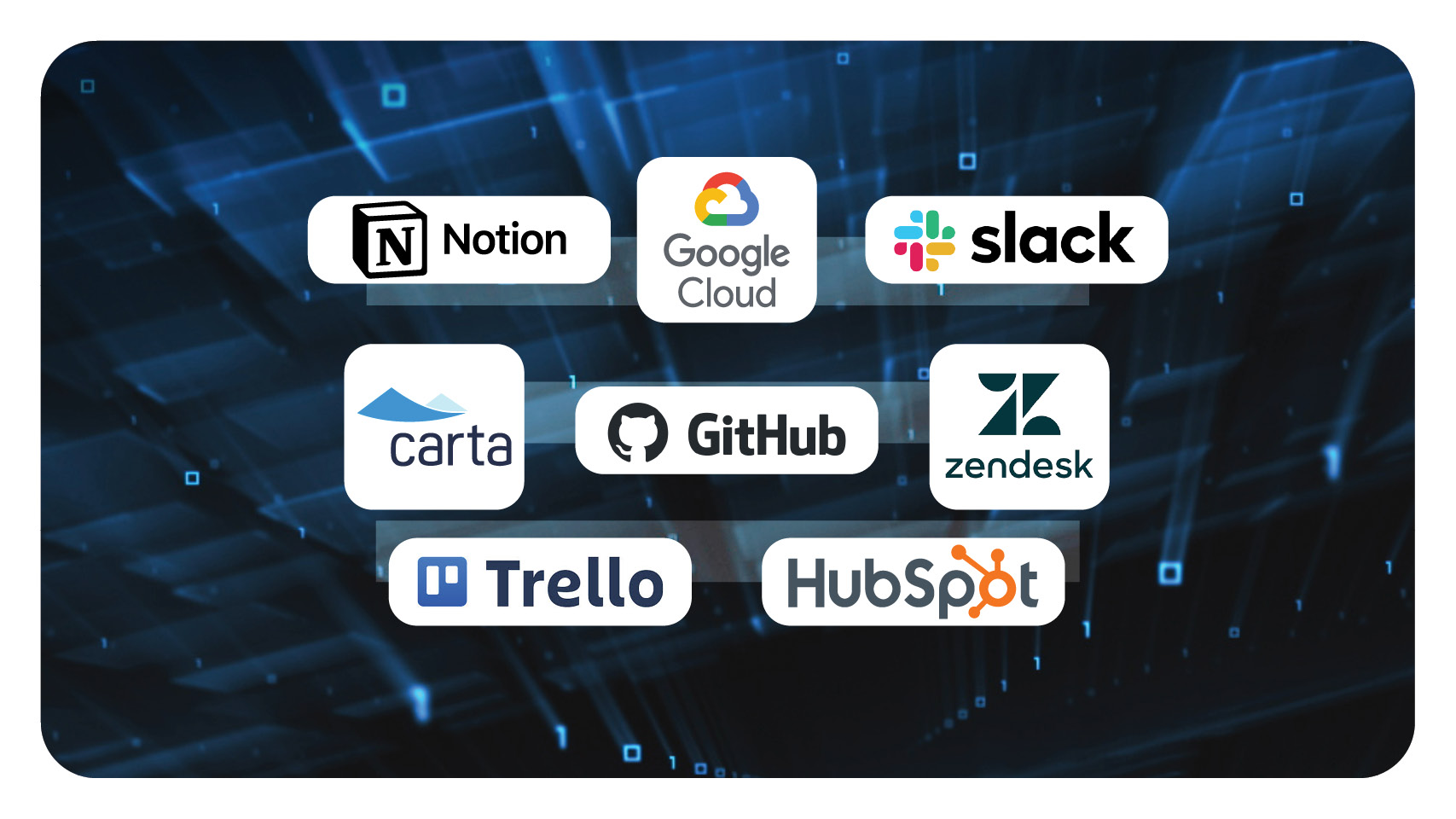
The Early-Stage Startup Tech Stack: What Actually Works as You Grow
.png)
Founders don’t need another opinionated list of tools. What they actually need is clarity.
At Proven, we get a unique view into how startups operate day to day, not just the tools they say they use, but the ones that consistently show up as the preferred choice across real workflows. That perspective reveals something important: the startup tech stack most teams rely on isn’t about having the best-branded tools on the market. It’s about choosing the right tech stack for the initial stages of the startup journey, then adapting as the business grows.
This article aims to move early-stage teams from chasing shiny new features and over-engineered complex systems, which might be great, but not where they're at in their entrepreneurial journey. Instead, we want to show you what other early-stage startups actually use, why those choices make sense, and where things typically start to break down so you can avoid common pitfalls as you build.

What Early-Stage Teams Actually Use
When launching a startup, most small teams gravitate toward familiar, user-friendly tools that help them build fast, stay on the same page, and avoid unnecessary cost. At this stage, speed matters more than perfection, and premature optimization can do more harm than good.
Across many companies, we consistently see teams assemble a tech stack built around a few core needs:
- Internal communication and collaboration
- Documentation and knowledge sharing
- Task tracking and execution
- Lightweight infrastructure for building products
Rather than carefully evaluating every option, teams tend to default to tools that are easy to adopt under pressure. For documentation and day-to-day collaboration, familiar options like Google Workspace or Notion often become the starting point.
For internal communication, many teams rely on Slack, while lightweight task tracking frequently lives in tools like Trello.These tools appear repeatedly not because they’re perfect, but because they reduce context switching, offer useful built-in features, support single sign-on, and help teams collaborate with minimal setup. They provide a solid foundation that allows employees to focus on creating value instead of managing software.
In the early stages, teams prioritize making things work over how they’re built. Some startups, particularly those focused on building products, invest time in code, programming languages, and custom systems.
Many others rely on low code, pre-built enterprise software, or external vendors when software isn’t central to the business itself.
What they all have in common isn’t a technical approach, but a set of constraints: limited time, evolving priorities, and a strong need for alignment as the business grows. At this point, the goal isn’t perfect architecture; it’s maintaining momentum and choosing the right tools to support progress without slowing down.
Why These Choices Make All the Difference Early On
In the initial phase of growing the startup, choosing the right tools isn’t about building the perfect tech stack; it’s about protecting momentum. Early progress is fragile, and the wrong decisions introduce friction long before anyone notices it.
Most founders aren’t optimizing for sophistication. They’re optimizing for speed with control.
That’s why early teams consistently prioritize:
- Cost effectiveness, because cash is optionality
- Fast setup, because delays compound
- Minimal training, because time spent onboarding tools steals focus from customers
- Tools that work out of the box for small teams, without heavy configuration
Free plans or a sensible paid tier matter not just for budget reasons, but because they allow teams to experiment without commitment. Locking into rigid tools too early creates vendor lock-in before there’s clarity on product market fit, and undoing those decisions later is far more expensive than getting them right up front.
What’s often underestimated is how much cognitive load tools introduce.
Every additional system:
- Creates more context switching
- Requires shared conventions
- Adds another place where information can get lost
That’s why many early teams deliberately choose flexible internal tool setups, low-code solutions, or widely adopted software, not because they’re perfect, but because they reduce friction while the business idea is still evolving.
When these choices are made well, teams gain very practical advantages.
They streamline workflows, which prevents handoff confusion, reduce repetitive tasks that drain attention, and make it easier to make informed decisions without adding unnecessary overhead.
Most importantly, good early tooling creates internal clarity. Teams know where decisions live, which tools are used for what, and how information flows between employees, customers, and external partners, even if those groups never see the same systems.
That clarity helps teams catch problems early, respond consistently, and stay focused on progress rather than process.
At this phase, the priority isn’t scaling or optimizing. Instead, it’s about beginning to build fast with just enough structure to enable progress. Teams that strike this balance effectively tend to move faster and have more flexibility to refine their decisions later.
Where Does The Tech Stack Typically Crumble?
There's the major issue most founders don’t anticipate, not because they miss it, but because it doesn’t show up all at once.
Internal tools usually work just fine inside the company. They help teams communicate, track work, and move faster within a small group. The strain appears gradually, as soon as the startup starts relying on external services.
That might include banking services, enterprise software, agencies, contractors, legal providers, or ecommerce platforms.
Each new vendor brings its own expectations and constraints and very few of them fit neatly into the tools the team already uses.
In such cases, coordination tends to get fragmented.
Communication spills into:
- Email threads no one fully owns
- Shared spreadsheets that go out of date
- Ad-hoc documents created to “just get this done once”
- Scattered data across other tools added for one specific need
Nothing is broken, but nothing is fully visible either.

Why This Becomes a Real Problem as Teams Grow
At first, this feels manageable. Someone on the team “just knows” where things live. Decisions happen in calls. Context sits in people’s heads.
But as the business grows even slightly, this informal coordination starts to fail.
Ownership becomes unclear. Important process details live in inboxes or private notes. Questions around local laws, access, or approvals surface late instead of early. And because each vendor relationship is handled a little differently, teams slowly lose a shared common language for how work gets done.
This creates a subtle but persistent drag:
- Decisions get revisited because prior reasoning isn’t documented
- New team members struggle to understand how things actually operate
- Founders spend time unblocking old issues instead of moving the company forward
What began as a lightweight, flexible setup turns into fragmented coordination. The tools that once helped boost productivity now require active effort just to keep everything running.
Why This Matters Even More at Portfolio Scale
For individual founders, these issues feel manageable until they’re not.
For VC platform and operations teams supporting multiple startups, the patterns are impossible to ignore. The same vendor challenges repeat across companies. The same questions come up. The same mistakes are made.
What looks like a small inefficiency at one company becomes a time sink across an entire portfolio.
Platform leaders don’t want to dictate tools. They want to help teams make informed decisions, avoid unnecessary cost, and create systems that scale without adding friction.
The Missing Layer
The problem isn’t that startups chose the wrong tools. Most early teams choose exactly what makes sense at the time.
The problem is that most tech stacks are designed to support internal collaboration not the growing web of external relationships that every startup eventually depends on.
As soon as vendors become critical to day-to-day operations, teams need a way to:
- Keep shared context without adding heavy process
- Understand who owns which relationships
- Maintain consistency as more people get involved
- Adapt as requirements change without rebuilding systems
Without that layer, coordination lives in workarounds. And workarounds don’t scale, they just spread.
This is the point where many teams feel the friction but struggle to name it. They don’t need more tools. They need better visibility and structure around how work with the outside world actually happens, without sacrificing the flexibility that helped them move fast in the first place.
Building a Stack That Grows With You
A winning tech stack isn’t about impressiveness. Its main purpose is to facilitate product development, customer service, and business growth amid changing circumstances. In the startup phase, teams typically require clarity over complexity. They need tools that align with current workflows, not future possibilities as the company scales.
Consequently, the most effective stacks are usually straightforward, familiar, and adaptable initially, even if they are not ideal.
The stacks we've seen hold up over time tend to share a few characteristics. They:
- Respect the realities of the early stage, including limited time, small teams, and shifting priorities
- Avoid premature optimization that adds process before there’s certainty
- Allow teams to adapt as the business grows, without forcing painful rework
- Reduce the mental overhead of managing tools, so founders can focus on decisions that matter
The key difference between a functional stack and a scalable one is the timing of when teams introduce structure, not how much they add. Incorporating the right layer at the right time enables teams to move faster without sacrificing visibility, reduces risk without causing delays, and builds systems that support progress rather than hinder it.
Over time, these small, timely decisions accumulate, saving time, reducing friction, and making it easier for teams to handle increasing complexity.
This is what transforms a good tech stack into the right one, not by predicting the future, but by maintaining enough flexibility to adapt as it grows. That’s why some teams include a lightweight layer to streamline vendor workflows without replacing existing tools. Learn how Proven fits into an early-stage stack.












